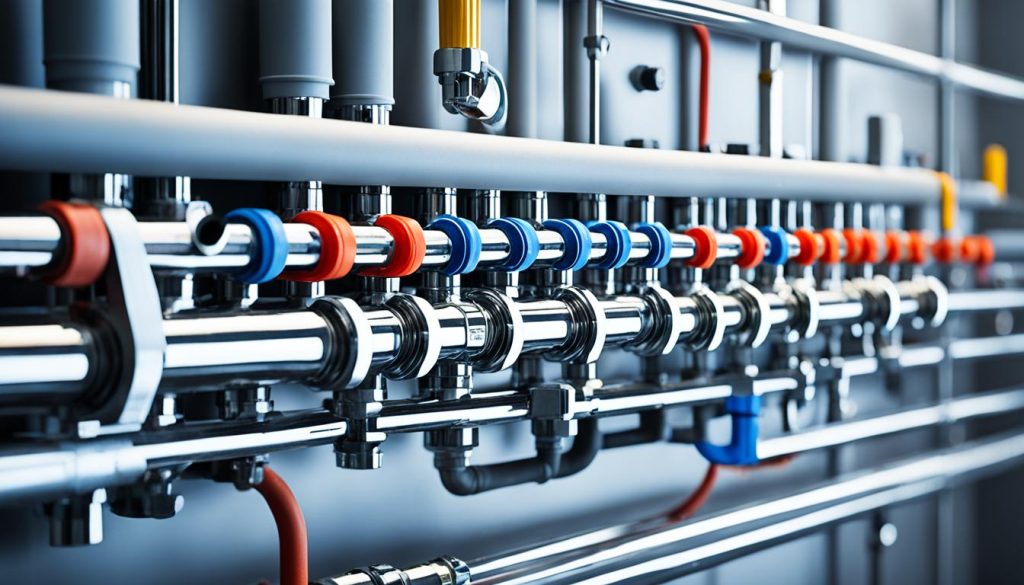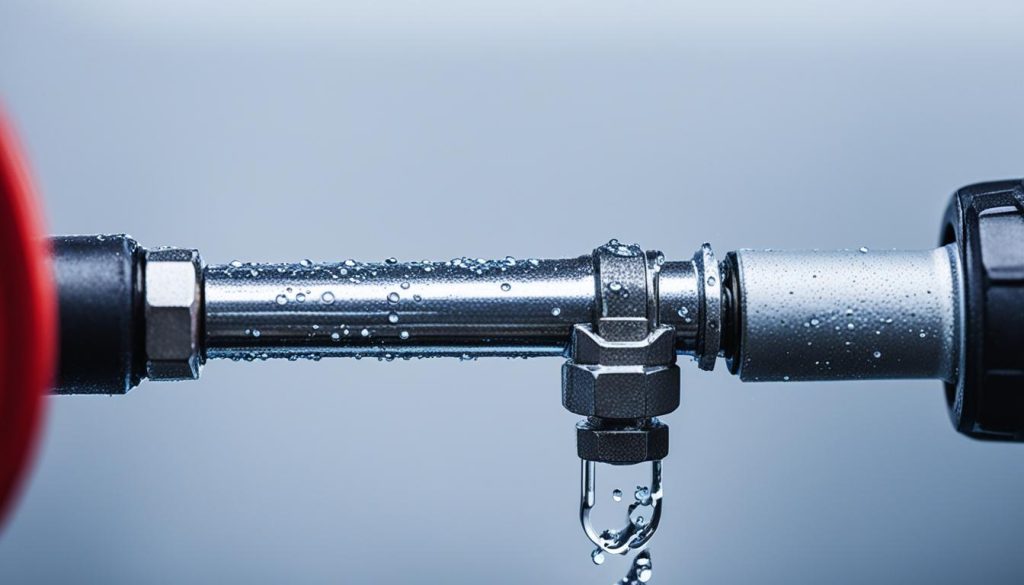The Essentials of Plumbing: Why It’s Crucial
Did you know that without plumbing, the average person would spend over 200 hours each year collecting and carrying water? That’s equivalent to almost 9 days! Plumbing is much more than just pipes and drains – it’s a vital system that ensures our homes and businesses have access to clean water and effective sanitation.
Understanding the importance of plumbing is essential for homeowners and businesses alike. From the significance of proper installation and design to common plumbing problems and the benefits of professional plumbing services, let’s explore why plumbing plays a crucial role in our day-to-day lives.
Key Takeaways:
- Plumbing is crucial for providing safe water and effective sanitation.
- Proper installation and design are important for the longevity of a plumbing system.
- Maintaining a plumbing system can help prevent common problems.
- Hiring professional plumbing services ensures expertise and adherence to local codes.
- Plumbing saves time and effort by providing convenient access to water.
The Components of a Plumbing System
A plumbing system consists of three main components: the water supply system, the water heating system, and the wastewater drainage system. These components work together to provide clean water for various purposes and effectively remove wastewater. Understanding the function and importance of each component is essential for homeowners and businesses to ensure a reliable and efficient plumbing system.
The Water Supply System:
The water supply system is responsible for delivering water to the home from either city water or well water sources. It involves a network of pipes, valves, and fixtures that distribute water to different areas of the building. The quality and pressure of the water supplied by this system directly impact the functionality and convenience of daily activities such as cooking, cleaning, and bathing. Therefore, it is crucial to maintain the water supply system and promptly address any issues to ensure a continuous flow of clean water.
The Water Heating System:
The water heating system is an integral part of a plumbing system, especially in regions with colder climates. It involves a water heater that warms the water to a desired temperature for various uses, such as bathing and washing dishes. The water heating system can utilize different energy sources, including electricity, gas, or solar power, to heat the water. Regular maintenance and proper insulation of the water heater help maximize its efficiency and reduce energy consumption.
The Wastewater Drainage System:
The wastewater drainage system is responsible for carrying away used water and ensuring proper sanitation. It consists of a network of pipes, vents, and traps that divert wastewater from sinks, toilets, showers, and other fixtures to the main sewage or septic system. Proper drainage prevents the accumulation of wastewater, potential contamination, and unpleasant odors. Regular maintenance and periodic cleaning of drains can help prevent clogs and maintain the proper functioning of the wastewater drainage system.
Understanding the components of a plumbing system allows homeowners and businesses to make informed decisions, ensure efficient water supply, and prevent issues related to wastewater drainage. Next, we will explore the importance of proper installation and design in maintaining a reliable plumbing system.
The Importance of Proper Installation and Design
When it comes to plumbing, proper installation and design are vital for the effective functioning and longevity of the system. Whether you’re building a new home or renovating an existing one, paying attention to these aspects can save you from future headaches and costly repairs.
One key element in plumbing installation is using quality materials. Opting for durable and reliable materials, such as PVC and ABS pipes for wastewater drainage, ensures that your plumbing system can withstand the test of time. These materials are known for their resistance to corrosion and leaks, providing you with peace of mind.
The design of your plumbing system also plays a crucial role in its efficiency. The water supply system, for instance, may vary depending on whether you’re connected to a municipal water source or using well water. Understanding the specific requirements for each situation will help you make informed decisions and ensure a reliable water supply.
Additionally, proper slope and correct installation of pipes, fittings, and vents are essential for maintaining efficient water flow and preventing common issues like clogs and leaks. A well-designed plumbing system will minimize the risks of blockages and water damage, keeping your home safe and comfortable.
Overall, investing in proper installation and design is a wise choice for any plumbing project. By using quality materials, considering the specific needs of your water supply, and ensuring well-planned pipe layouts, you can enjoy a reliable and efficient plumbing system for years to come.
Common Plumbing Problems and Maintenance
Plumbing problems can be a source of frustration for homeowners and businesses alike. From clogs to leaks, these issues can disrupt daily routines and cause extensive damage if not addressed promptly. However, with proper maintenance and preventive measures, many of these problems can be avoided altogether.
Identifying and Addressing Plumbing Problems
One of the most common plumbing problems is clogged drains. Whether it’s a slow-draining sink or a completely blocked toilet, clogs can quickly escalate into bigger issues if not dealt with promptly. Regularly clearing drains, using drain guards to catch debris, and avoiding pouring grease down the drain can help prevent clogs from occurring.
Leaks are another prevalent plumbing issue that can lead to water damage and high utility bills. It’s important to regularly inspect pipes, faucets, and fixtures for any signs of leaks, such as water stains or dripping sounds. Promptly addressing leaks can save both water and money in the long run.
Malfunctioning fixtures, such as a constantly running toilet or a dripping faucet, are not only annoying but can also waste water. These issues are often caused by worn-out parts that need to be replaced. It’s recommended to hire a professional plumber to diagnose and fix these problems efficiently.
Low water pressure can be frustrating, especially when trying to take a shower or wash dishes. This issue can be caused by various factors, including a clog in the waterline or a problem with the water pressure regulator. Consulting with a professional plumber is crucial to identify the root cause of low water pressure and resolve it effectively.
Maintaining Your Plumbing System
Regular maintenance is key to preventing plumbing problems and ensuring the longevity of your system. Here are some essential maintenance tips:
- Keep drains clear by flushing them with hot water or using a mixture of vinegar and baking soda to break down buildup.
- Inspect pipes for leaks or damage regularly, especially in areas with exposed pipes.
- Drain the water heater periodically to remove sediment and maintain its efficiency.
- Winterize exposed pipes during colder months to prevent freezing and potential pipe bursts.
By making these maintenance tasks a part of your routine, you can minimize the risk of plumbing problems and save money on costly repairs.
| Common Plumbing Problems | Preventive Maintenance Tips |
|---|---|
| Clogged drains | Clear drains regularly and use drain guards to catch debris |
| Leaks | Inspect pipes, faucets, and fixtures for leaks; address promptly |
| Malfunctioning fixtures | Hire a professional plumber to diagnose and fix issues |
| Low water pressure | Consult with a plumber to identify and resolve the cause |
The Importance of Professional Plumbing Services
When it comes to plumbing issues, it’s tempting to roll up your sleeves and try to tackle them on your own. However, the importance of professional plumbing services cannot be overstated. Hiring a reputable plumbing contractor ensures that your plumbing system is in capable hands and can save you time, money, and headaches in the long run.
Professional plumbers have the necessary expertise and knowledge to handle complex plumbing installations, repairs, and maintenance. They are well-versed in local codes and laws, ensuring that your plumbing work is up to standard and compliant. With their specialized equipment and training, plumbers can quickly identify the root cause of the problem and provide effective solutions.
In emergencies such as severe leaks or clogged drains, emergency plumbing services are invaluable. Plumbing emergencies can cause significant damage to your property if not addressed promptly. Professional plumbers are available around the clock to provide immediate assistance and prevent further harm. Their prompt response and expert handling can minimize the impact of a plumbing emergency and help restore your peace of mind.
Whether you’re dealing with routine plumbing maintenance or facing a plumbing crisis, it’s always wise to rely on professional plumbing services. By entrusting your plumbing needs to experienced professionals, you can ensure the proper functioning and longevity of your plumbing system. So, the next time you encounter a plumbing issue, don’t hesitate to call a reputable plumbing contractor. Your plumbing system will thank you.
Source Links
- https://teamenoch.com/blog/plumbing-basics/
- https://www.misterplumber.ca/plumbing-basics/
- https://www.dunnriteplumbing.ca/understanding-plumbing-basics/
- Investing Wisely: How Windows & Doors in Boost Property Value and Financial Health - April 24, 2025
- The Financial Impact of Personal Injuries: Why Legal Help Matters for Business Owners - April 16, 2025
- The Hidden Financial Costs of Domestic Assault: What Business Owners Need to Know - April 16, 2025













